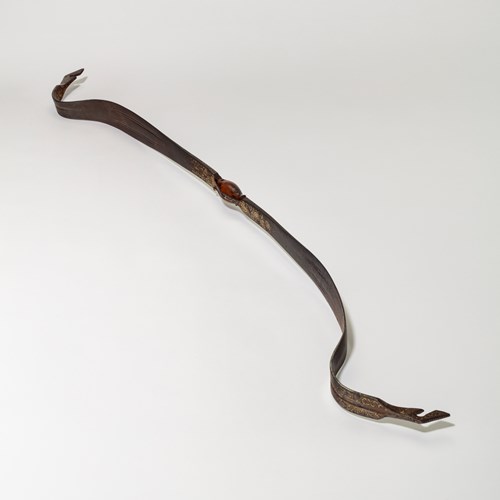Royal Talpur Sword
Date Late 18th – Early 19th century
Period 1750-1850, 18th century, 19th century
Origin Sindh, Pakistan
Medium Iron, gold
Dimension 84 cm (33¹/₈ inches)
‘Sarkar Mir Subedar Khan Talpur’
Mir Subedar Khan Talpur (d.1846) was the son of the ruler Mir Fath ‘ali Khan Talpur (d.1801), from the Talpur ruling house of Hyderabad. The Talpur Dynasty ruled Sindh (present-day southeast Pakistan) from the late 18th to the early 19th century. Mir Fath ‘ali Khan Talpur became the first official ruler of Sindh, under Afghan sovereignty, following the battle of Halani in 1783.[1] Mir Subedar Khan is possibly the same person as the poet who composed a versified history of the Talpur dynasty called the Fathnama.[2]
The second section of calligraphy, in the cartouche next to the hilt, reads:
‘Work of Asadallah Isfahani’
Asadallah Isfahani is traditionally considered to be the most celebrated Persian sword maker. Despite his name appearing on many blades, very little is known about him. Dated examples bearing his name range from the 15th to the early 19th century, suggesting the continued use of his name was a sign of quality.[3]
For comparative examples of this type of sword, see the Royal Armouries Collection, Leeds, Accession Number XXVIS.135; and the Metropolitan Museum of Art, New York, Accession Number 26.35.1a, b, and published in Alexander, pp. 182-83, No. 69, for a Persian example with the same signature of ‘Asadallah Isfahani’.
Stock no.: A4699
Date: Late 18th – Early 19th century
Period: 1750-1850, 18th century, 19th century
Origin: Sindh, Pakistan
Medium: Iron, gold
Dimension: 84 cm (33¹/₈ inches)
Literature: Alexander, D. G. Islamic Arms and Armor in the Metropolitan Museum of Art, The Metropolitan Museum of Art, New York, 2015.
Askari, N. Treasures of the Talpurs: Collections from the Court of Sindh, Mohatta Palace Museum, Karachi, 1999.
Storey, C.A. Persian Literature: A Bio-Bibliographical Survey, II, 3. M: History of India, Luzac and Co., London, 1939.
More artworks from the Gallery









